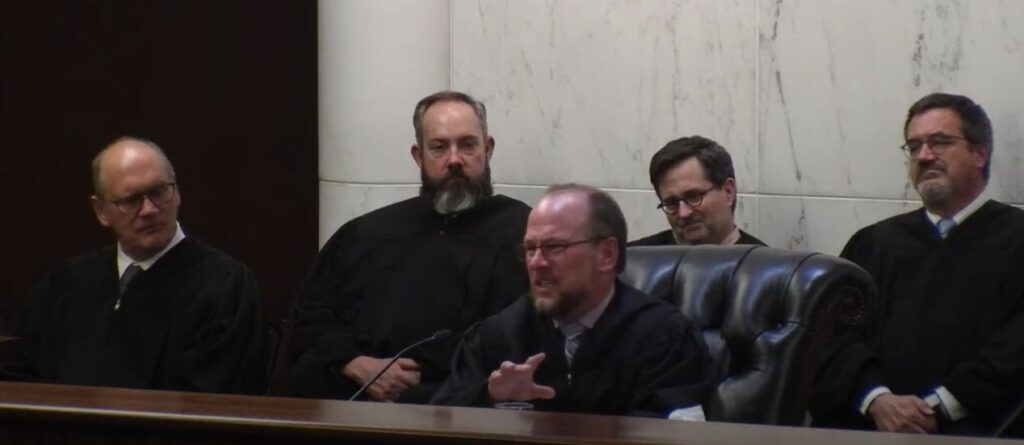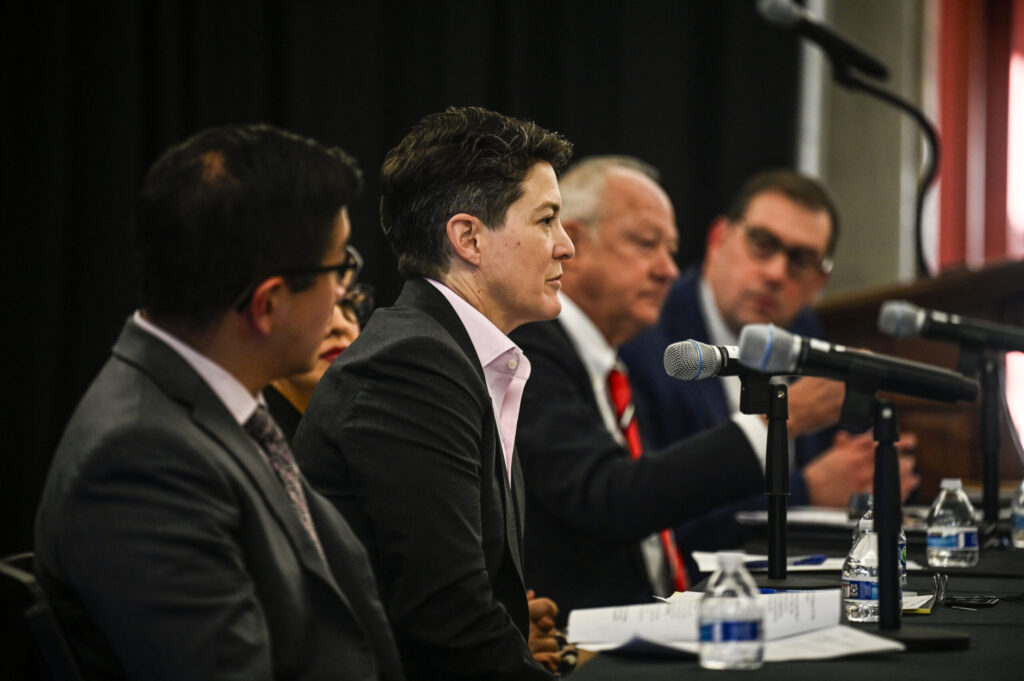Q&A with Spencer Bailey | Eviction defense lawyer pushes appellate courts to decide tenant issues
Colorado’s Supreme Court and Court of Appeals rarely issue opinions in evictions cases. But Spencer Bailey has repeatedly put multiple questions of evictions law before the state’s appellate courts in recent years to clarify the rights of tenants.
An eviction defense attorney with CED Law, Bailey has prompted the Supreme Court to rule that a 30-day notice period for landlords still applies under an early-pandemic federal law; that Colorado law always permitted tenants to assert their landlord’s discrimination as a defense; and that a state law protecting First Amendment activity can be invoked in an eviction case. There is another pending case about whether a right to a jury trial exists in certain evictions proceedings.
Bailey said he would not likely forget his first time in an eviction court in St. Louis, where he attended law school.
“I spent hundreds of hours in law school reading about the exalted importance of fair trials and judges speaking eloquently about the bedrock principles of due process and justice that are central to our court system and central to our nation’s laws,” Bailey said. “Then, I walked into an eviction courtroom and I felt like I didn’t see any of that.”
He spoke to Colorado Politics about his unique work of asking the state’s appellate courts to hand down precedent clarifying how evictions ought to occur.
FAST FACTS:
• Spencer Bailey is an appellate attorney with CED Law, the law firm of the Community Economic Defense Project in Denver
• He graduated from Washington University School of Law in St. Louis in 2020
• Previously, Bailey worked at the Colorado Poverty Law Project and clerked at the U.S. District Court for the Eastern and Western Districts of Kentucky
Colorado Politics: You have litigated appeals before the Colorado Supreme Court and Court of Appeals that stand out because they deal with the law around evictions. Can you explain why it’s relatively rare that the appellate courts hear evictions cases?
Spencer Bailey: Because nearly all eviction cases begin in county court, an appeal from county court would be to the district court. Any further appeals skip over the Court of Appeals and would go straight to the Supreme Court. It’s a little strange but that’s how the process goes. And the district courts that decide these county court appeals, they’re just one judge.
They never really get noticed by other courts or noticed by the public. If you want to get a published (precedent-setting) decision on an eviction issue, you have to get into the state Supreme Court. But the Supreme Court only takes a very small percentage of cases that are appealed to them — I think it’s around 5%. By the time you’re asking the Supreme Court to take an eviction appeal, you’re competing with so many other issues, so many other cases that are also asking for review, and you’ve got a 5% chance that the Supreme Court is going to want to take up that case.

Supreme Court Justice Monica M. Márquez smiles during a swearing-in ceremony for the first-ever class of licensed legal paraprofessionals, a newly authorized occupation allowed to practice law to a limited extent. The LLPs took an oath of office in the Colorado Supreme Court’s courtroom on Thursday, June 20, 2024. (Stephen Swofford, Denver Gazette)
I think another reason is that most evictions are brought against renters who are not represented by an attorney and often cannot afford to hire an attorney. Legal questions that get decided in an appeal are rarely raised by a tenant who’s unrepresented in the trial court. So, those legal questions never get presented to the trial court, which means there’s really no strong legal questions to raise in an appeal.
And there’s also just significant barriers to tenants who want to appeal a case if they’ve lost at trial. Like, for example, if the tenant wants to stay in their home during the appeal, they often have to pay an appeal bond to actually stop the eviction while they await the outcome of the appeal. They also have to pay hundreds of dollars, sometimes thousands of dollars, to get a transcript of the trial made in order for there to be any appellate review. Many tenants cannot afford these costs.
So, those act as very significant hurdles that many tenants can’t get over in order to appeal their case. There’s still enormous pressure on a tenant to just settle their case or to just move out to avoid any further litigation because tenants would rather not have an eviction judgment appear on their rental history while they’re waiting a decision on appeal.
CP: Last fall, Justice Melissa Hart suggested lawyers think creatively about how to put topics in front of the Supreme Court that it typically doesn’t get a chance to see. Do you think our current Supreme Court is unusually open to fleshing out evictions case law at this point? Why might that be the case?

A discussion about the Colorado and U.S. constitutions at the University of Colorado in downtown Denver on Oct. 12, 2023. From left to right are Alicia Bannon of the Brennan Center for Justice, Tom Romero of the University of Denver’s law school, Justice Melissa Hart and moderator Chandra Thomas Whitfield of CPR.
Bailey: Yeah, I certainly do think our current state Supreme Court is more open to deciding these issues that come up in eviction law, or just in a landlord-tenant context, more so than they have been in the recent past.
Why they’re doing that, though, I think I can only speculate. Part of it could be that housing issues are getting a lot more attention and public discourse in the media and in the state and local legislatures across the country. So, that may have directed some of the justices’ attention to this area of law that’s greatly affected many people’s lives. But there’s just been so little scrutiny of the trial courts who have been making these consequential decisions around eviction law. And there’s been so little guidance from the appellate courts. Maybe they’ve just decided that it’s time to step in and provide a little bit more of that guidance.
CP: Are you aware if there was anyone putting in the degree of effort that you are currently putting in, maybe a couple of years or a decade ago?
Bailey: No, I don’t know of anyone who had been putting these issues before the Supreme Court with the same frequency as I have and the law firm that I work with has been. Until the pandemic, there was not a lot of funding to provide tenants with legal representation.
CP: Who are your clients, how do they come to you and how do you decide which cases to appeal?
Bailey: I’m an attorney with CED Law. We offer legal guidance and representation to Colorado tenants who are facing eviction or any other kind of housing instability. Typically, tenants find out about our free legal services just through, you know, searching for it online or talking to nonprofit organizations that will refer them to us or other legal aid organizations. Colorado Legal Services will refer tenants to us whenever they can’t handle the caseload themselves. We also operate some legal clinics at various courthouses around Colorado.

The 123-unit Pop Denver apartment complex, 625 Santa Fe Drive, Denver is almost ready for occupancy. Developer First Stone Development originally envisioned condominiums for the units, but interest rate spikes in 2022 changed plans.
The most important consideration is whether the client wants to appeal. Appealing sometimes means living with uncertainty for many, many months and not every tenant wants to do that. But tenants recognize that an appeal may not only help themselves individually in their case, but also impact other tenants in future cases. It’s a frequent motivation of my clients that they want to use their situation to hopefully get a good outcome that will also help others.
So, finding a client who has that viewpoint and that motivation can make it easier to present the opportunity to appeal a case. Other than that, I typically look for cases that raise issues that are very straightforward and come up pretty frequently in the eviction context. I need to make sure the issues were actually litigated and that they were ruled on at the trial, and make sure the questions we want answered can be cleanly presented to the appellate court.
We’re often looking for those kinds of issues that are frequently coming up in cases and that we feel like — and that our clients feel like — go to the heart of a fair eviction process.
CP: The state legislature hasn’t been shy about eviction reform. Why is it important to ask the appellate courts to weigh in rather than pursuing additional policy changes?

Governor Jared Polis signs HB 1098, which requires landlords to have cause to evict tenants, into law as the bill’s sponsors look on.
Bailey: The state legislature passes and amends the laws, but at the end of the legislative session, all the General Assembly has done is put some words on a page. It’s in court where those words are turned into real rights and obligations and remedies for real people. They’re only meaningful if the courts understand and apply those statutes faithfully in every case and as the General Assembly intended.
And, unfortunately, it is in my experience extraordinarily common that county courts do not apply the law correctly, they misconstrue the law, and that makes those rights and protections passed by the General Assembly effectively meaningless to the individual tenants and families. So, that’s where the appellate courts play a central role in supervising the county courts and ensuring they apply the law correctly and consistently.
CP: What kinds of questions do you hope the Supreme Court will answer next?
Bailey: I think there are many important, unresolved issues that everyone would greatly benefit from the Supreme Court weighing in on. Even if it’s a decision that I personally disagree with, just having the clarity is very important to help you advise your client of what their options are. And it helps when the General Assembly starts another session. They can see the court has interpreted a statute in a particular way and then they can decide whether they want to make an amendment or clarify the statute. When you just have a bunch of different decisions from different county court judges, those never really catch the attention of the General Assembly.

The Lindsey-Flanigan Courthouse in Denver.
In terms of issues that I would like to see them weigh in on, it’s ones that frequently come up around a tenant’s right to due process and a fair trial. What I mean by that is in an ordinary lawsuit, a fair trial typically means that both sides have a pretty good idea of what evidence the other side has and nobody gets away with hiding facts. Nobody gets away with hiding evidence that may harm their position or withholding evidence that may help the other party. So, when the case goes to trial there’s no big surprises and everyone is fully prepared to litigate their position as best they can and that creates a fair trial.
Unfortunately, in eviction cases, that’s not often how it goes. County courts see these cases as expedited, which they are, so landlords can frequently get away with not disclosing all that evidence. Or if a tenant complains the landlord is withholding critical information or evidence that could be beneficial for their defenses, sometimes you’ll see the judges sort of shrug and say, “Well, it’s expedited, so we’re gonna go to trial anyway.” And in my view, that’s not a fair trial.
Another example might be the landlord says, “My witnesses are not available on the day of trial.” Judges will almost always say, “All right. Let’s reschedule the trial.” But if the tenant says, “My witnesses are not available on the day of trial,” you’ll rarely see a judge agree to reschedule. Again, those are the kind of issues that I would very much appreciate some appellate court review to get some guidance for the trial courts as to how they should be resolving these disputes, in light of the fact that eviction cases are supposed to be on a fast track.











